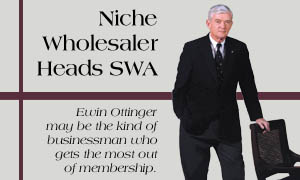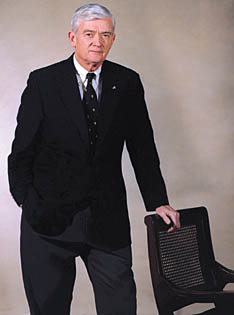

"Maybe the big companies can do a lot of training on their own, but for someone like me, the educational opportunities gained through SWA have been priceless," says Ewin Ottinger, owner and president of GGLC.
After graduating from the University of Tennessee in 1960 with a degree in industrial management, Ottinger spent some time in the corporate world. He was employed as administrative vice president for a plastics manufacturer when he got bitten by the entrepreneurial bug. GGLC, a company that had been around since 1923, became available and Ottinger purchased it in 1978, along with two business partners who departed three years later.
At first the company operated like most plumbing wholesalers in supplying a range of residential and commercial jobs. As the years went by, GGLC narrowed its scope to the point where it concentrates almost exclusively on servicing the maintenance and repair needs of apartment owners and managers. They avoid the high-priced plumbing lines common to the industry. GGLC's shelves are more likely to be filled with the likes of Mansfield, Briggs, B&K faucets and Brass-Craft fittings - along with Bradford-White water heaters, which Ottinger singles out as "being a great company to deal with."
Besides plumbing, GGLC stocks appliance and some small electrical parts - "anything related to habitability issues of apartment owners," is the way Ottinger describes his business.

In The Land Of Giants
The local Norfolk market was dominated by smallish independent wholesalers when Ottinger first bought into it more than two decades ago. He remembers supplying the piping system for a major hospital addition at the time. "The large companies were not as large as they are now," he observes. "It's just not possible for a small company like mine to compete against them anymore."By necessity, GGLC adopted its "hit 'em where they ain't" strategy of specializing in a market niche the big boys don't pay much attention to, and which places value on fast, personalized service. "As it became more difficult to get supplies at the right price, we fell into selling apartment complexes where the cash demands were less and products more predictable," says Ottinger. "I'd like to say we pursued it like a Harvard Business Plan, but it was just a matter of gravitating toward what we did best."
I asked him if the future looks as bright for a little company like his as it did 20 years ago. "It looks brighter!" he answers without hesitating. "That's because we do what we do very well. Market entry is always a big hurdle, but now that we're in the market, it's simply a matter of keeping our customers content."
He defines customer service as his competitive edge - perhaps the only way a company the size of GGLC can gain business at the expense of someone else. "If an apartment complex has a water heater down, a tenant is going to get annoyed when he wakes up the first morning without hot water. If it's still down the next morning, he'll be mad as heck, and if he still doesn't have hot water the third morning, he'll be looking to move.
"Our promise is if a customer calls us during the breakfast hours, we'll get a replacement water heater there by noon. If he calls us in the afternoon, we'll get it there by late afternoon or first thing next morning. This is the kind of attitude that protects us in the marketplace," says Ottinger.
Thank Goodness For SWA
As an outsider coming into the industry, Ottinger credits SWA for providing knowledge of the business and the contacts needed to thrive. "The benefits were mostly intangible but indispensable. It was a matter of learning how other people in the field did business, drawing from their wisdom and making the vendor contacts that I needed."Keep in mind that I came into the industry knowing nobody. Through SWA, I was able to meet many vendors and get to know them. I also found that SWA membership gave me a certain prestige when it came to dealing with those vendors. I don't think I would have had the same credibility without belonging.
"The other major thing for me was the educational opportunities," says Ottinger. "SWA's and ASA's programs really opened my eyes about the financial controls part of running a wholesale supply business, and watching inventory, and the importance of developing a fair pricing stance. I continue to send my people to the education programs offered by SWA and ASA. Everybody who's been there comes back learning something meaningful."
GGLC has 15 employees. One of them, general manager George E. Worley III, has been with the company 15 years and will play a bigger role than ever "minding the store" while the owner spends much of his time in the coming year tending to SWA business.
According to Ottinger, the biggest challenge he faces in business isn't much different than that faced by wholesalers of any size - "making sure you're getting effective performance from your staff. One of the biggest costs in my business is payroll, so I have to make sure we're using the human resource efficiently and effectively. That requires measuring sales output and reducing clerical errors. It's not so much a system that I use, as it is a stance I take to watch over everything."
Outlook For SWA
The biggest challenge facing SWA is the same facing virtually every trade association in a consolidating industry, according to Ottinger. "We have to maintain and grow the membership," he states. "The best way to do that is make sure we keep up the educational programming, especially the financial training for middle management and selling skills. The educational part of the association is its best chance to prove its worth to members. We will work hard at keeping education strong."In addition to his current stint through the officer chairs, Ottinger served on SWA's board in 1991-92. He is a strong believer not only in the regional association's value, but also in the American Supply Association. "There is a definite need for a national organization," says Ottinger. "I've served on the national board, and have seen things coming together. It's just a matter of finding out the appropriate roles SWA and ASA can play to complement each other."
